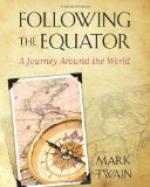We traveled up hill by the regular train five miles to the summit, then changed to a little canvas-canopied hand-car for the 35-mile descent. It was the size of a sleigh, it had six seats and was so low that it seemed to rest on the ground. It had no engine or other propelling power, and needed none to help it fly down those steep inclines. It only needed a strong brake, to modify its flight, and it had that. There was a story of a disastrous trip made down the mountain once in this little car by the Lieutenant-Governor of Bengal, when the car jumped the track and threw its passengers over a precipice. It was not true, but the story had value for me, for it made me nervous, and nervousness wakes a person up and makes him alive and alert, and heightens the thrill of a new and doubtful experience. The car could really jump the track, of course; a pebble on the track, placed there by either accident or malice, at a sharp curve where one might strike it before the eye could discover it, could derail the car and fling it down into India; and the fact that the lieutenant-governor had escaped was no proof that I would have the same luck. And standing there, looking down upon the Indian Empire from the airy altitude of 7,000 feet, it seemed unpleasantly far, dangerously far, to be flung from a handcar.
But after all, there was but small danger-for me. What there was, was for Mr. Pugh, inspector of a division of the Indian police, in whose company and protection we had come from Calcutta. He had seen long service as an artillery officer, was less nervous than I was, and so he was to go ahead of us in a pilot hand-car, with a Ghurka and another native; and the plan was that when we should see his car jump over a precipice we must put on our break [sp.] and send for another pilot. It was a good arrangement. Also Mr. Barnard, chief engineer of the mountain-division of the road, was to take personal charge of our car, and he had been down the mountain in it many a time.
Everything looked safe. Indeed, there was but one questionable detail left: the regular train was to follow us as soon as we should start, and it might run over us. Privately, I thought it would.
The road fell sharply down in front of us and went corkscrewing in and out around the crags and precipices, down, down, forever down, suggesting nothing so exactly or so uncomfortably as a croaked toboggan slide with no end to it. Mr. Pugh waved his flag and started, like an arrow from a bow, and before I could get out of the car we were gone too. I had previously had but one sensation like the shock of that departure, and that was the gaspy shock that took my breath away the first time that I was discharged from the summit of a toboggan slide. But in both instances the sensation was pleasurable—intensely so; it was a sudden and immense exaltation, a mixed ecstasy of deadly fright and unimaginable joy. I believe that this combination makes the perfection of human delight.




